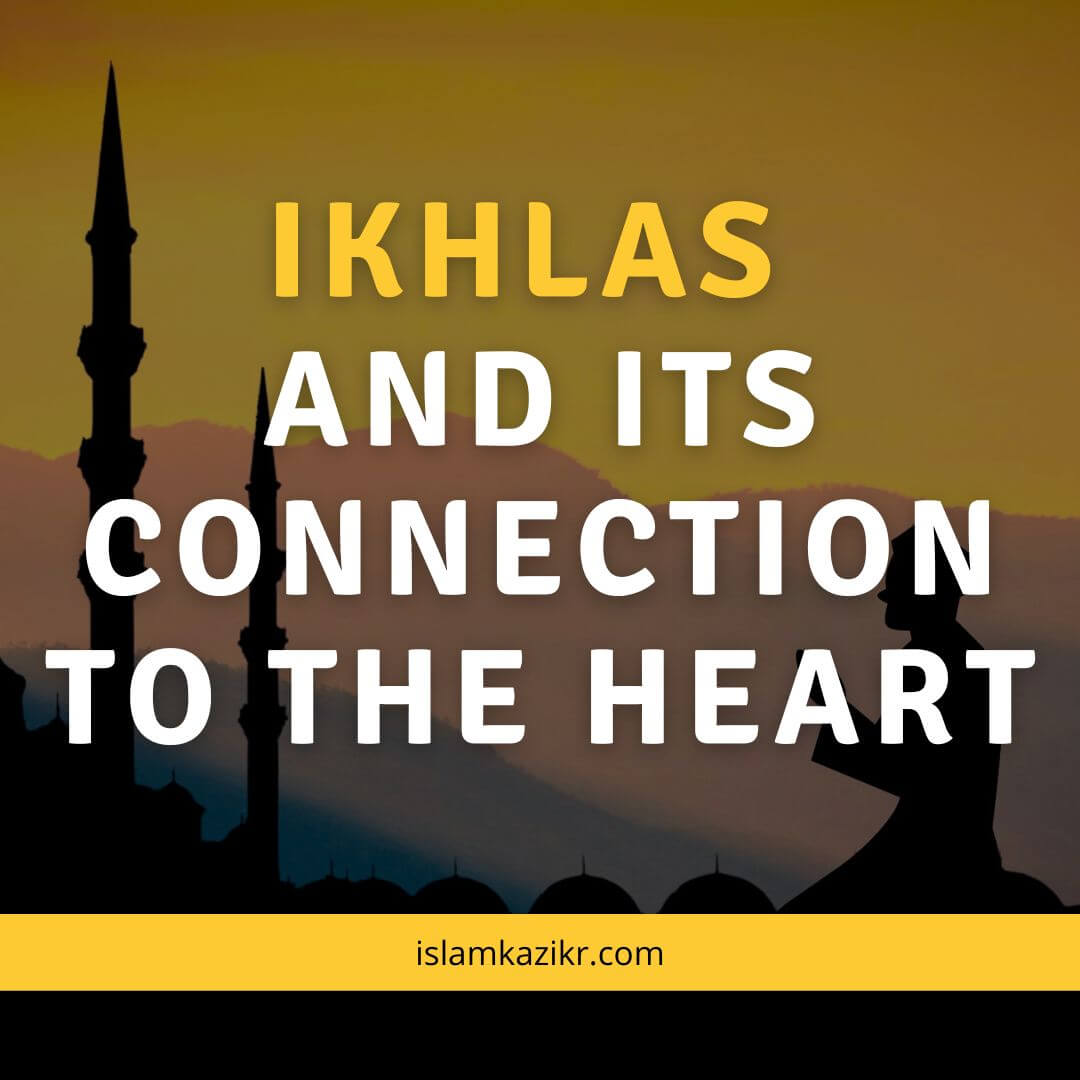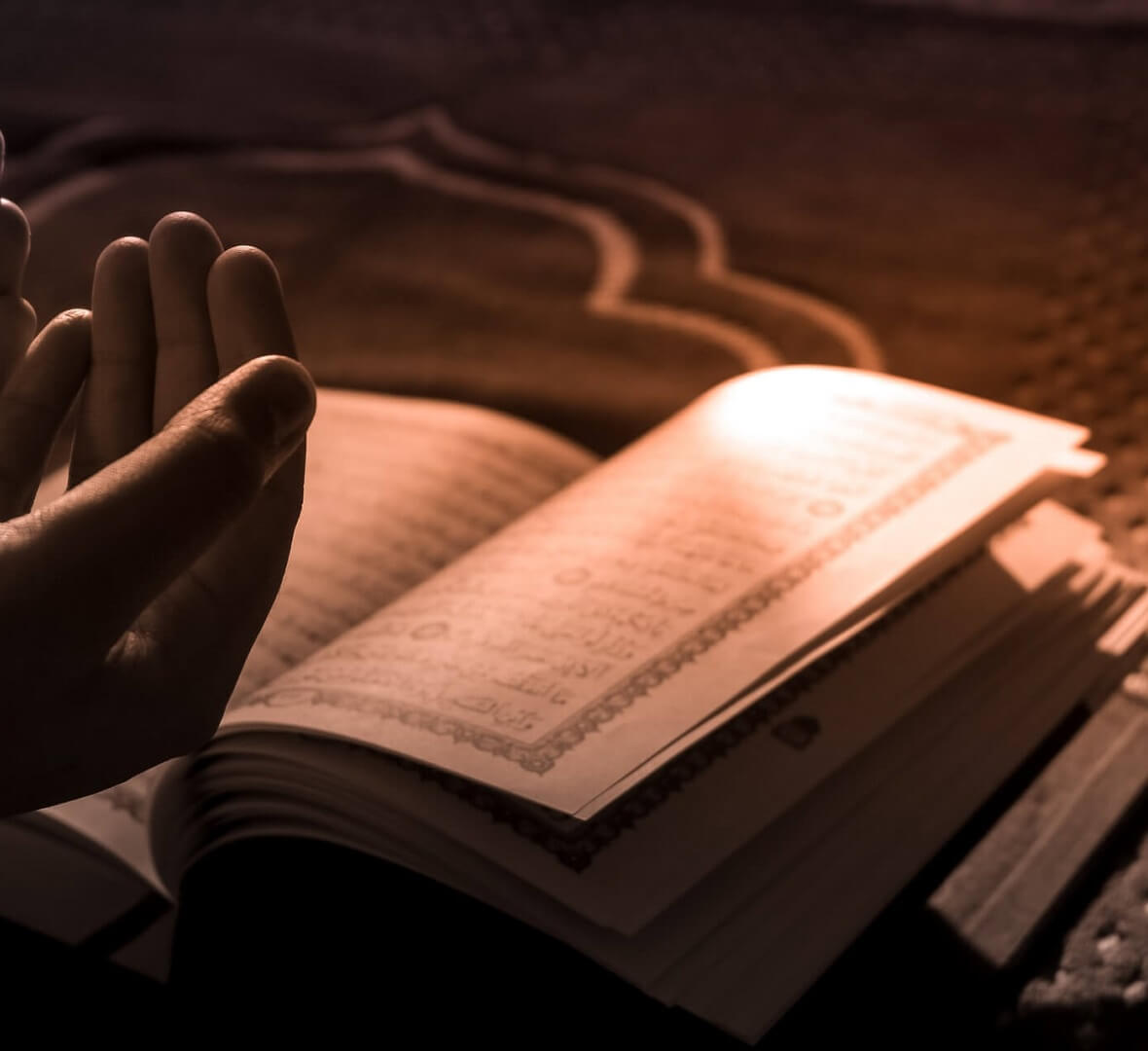Ikhlas is a form of worship of the heart. Scholars note that forms of heart worship include others as well such as humility Tawakkul (reliance on Allah), Khawf (fear of Allah), Rajaa (Hope in Allah), and Tawbah (repentance to Allah). The absence of these can lead to many diseases of the heart.
Ikhlas is taken from the root word kha-la-sa – when something in danger is saved (Rituals of a Worshipping Heart, Dr. Muhammad Ash-Shareef, 2020:51). Other scholars note that Ihklas means the presence of purity when something is not mixed with something else. In the Qur’an, the meaning of Ikhlas is purification/refinement.
And in its application, such as in Surah Al-Ikhlas, it is used to mean ‘sincerity’, or a purification of one’s intentions that guides one’s actions. Sincerity in Islam is the purification of intentions that reside in the heart. To remove any ulterior motive. So what is the heart being purified from in order to achieve sincerity?
According to the Miriam Webster English dictionary, Sincerity is defined as ‘Honesty of mind’, and ‘Freedom from hypocrisy’. While these meanings are true for Ikhlas, sincerity in the context of a Muslim is comparatively more complex than the general understanding of the word ‘sincere’. Surah Al-Ikhlas, which embodies the crux of our belief, is the primary indicator of the concept of sincerity in Islam; the absolute belief in the Oneness of Allah, its acceptance, and its practice – the establishment of Tawheed.
We call this sincerity because, without the sincere and undiluted performance of righteous deeds for the sake of Allah SWT alone, they would not be accepted by Him to have any lasting benefit for us in the Aakhirah. For why would a deed be accepted by Allah SWT if its intention was something other than for the sake of Him? This is why Muhammad SAW stated in a hadith that a deed will only be worth what it was intended.
Umar ibn al-Khattab reported: The Messenger of Allah, peace, and blessings be upon him, said, “Verily, deeds are only with intentions and every person will have only what they intended. Whoever emigrated to Allah and His Messenger, his emigration is for Allah and His Messenger. Whoever emigrated to get something in the world or to marry a woman, his emigration is for that to which he emigrated.”
Reference – [Sahīh al-Bukhārī 54, Sahīh Muslim 1907]
So intentions, no matter how good they are, if made for other than Allah SWT, and are manifested through deeds for other than Allah SWT, will only see their rewards in the Duniya. Therefore, the concept of sincerity in Islam clearly supersedes the general English definition of ‘freedom from hypocrisy. Muslim scholars note that Ikhlas from an Islamic perspective can mean not only the absence of Nifaq (hypocrisy), but also of shirk (idolatry), and Riya and Sum’ah (ostentation or show-off); the latter being forms of minor shirk (Natasha Kamaluddin 2020: 53).
The value of intentions is reiterated in yet another hadith. The hadith emphatically states that the intention to do a good deed is recorded by Allah SWT as one good deed even if the deed was not performed. Similarly intending something evil and not acting upon it is also recorded as a good deed. (Hadith 37, 40 Hadith an-Nawawi).
Therefore, casting out an evil intention for the sake of Allah SWT is just as good as having a good intention and not being able to perform that deed. Allah SWT takes into account the weight of the intention behind every single deed and will hold us accountable for this on the day of Judgement. Intentions, therefore, form the backbone of our acts and can either lead us to Jannah or Jahannam.
The declaration of Tawheed or the Oneness of Allah SWT is the way towards purging the heart of its various diseases to achieve true sincerity.
Indeed, We have sent down the Book to you ˹O Prophet˺ in truth, so worship Allah ˹alone˺, being ‘Mukhlisan’– sincerely devoted- to Him. (Surah Az-Zumar 39:2)
In this verse, ‘Mukhlis’ is someone ‘sincerely devoted’ to Allah SWT alone. Dr. Muhammad Musa Ash-Shareef states that Al-Mukhlis is also one saved by Allah:
‘Allah picked him out, safe from filth.’ (Rituals of a Worshipping Heart 2020:51)
The Heart
To the Muslim, the purpose of man’s existence on earth is very clear. Allah SWT has with certainty stated that this life is a test.
Every soul will taste death. And We test you (O humanity) with good and evil as a trial, then to Us, you will (all) be returned. – (Surah Al-Anbya 21:35)
˹He is the One˺ Who created death and life in order to test which of you is best in deeds. And He is the Almighty, All-Forgiving. – (Surah AL-Mulk 67:2)
We are here so that, from amongst us, Allah SWT could siphon the evil from the good. He does this by seeing which of us is ‘best in deeds’. In several places in the Qur’an and hadith, it is stated that deeds are tested through their rationalization and intentions in our ‘hearts’.
Whether you speak secretly or openly—He surely knows best what is ˹hidden˺ in the heart. – (Surah Al Mulk 67:13)
Abu Huraira reported: The Messenger of Allah, peace, and blessings be upon him, said,
“Verily, Allah does not look at your appearance or wealth, but rather He looks at your hearts and actions.” – (Sahīh Muslim 2564)
There is no ambiguity about this message in the Qur’an. Our deeds include every obligatory and voluntary act Allah SWT has commanded of man and every prohibition man must keep away from. But this test of life that Allah SWT puts us through is also unlike any other because, while these actions – “worship of the limbs” are important, the driving force behind them, is the determining factor. And that is the heart.
Muhammad Ash Shareef notes that the worship of the heart is far superior to that of the limbs. In the Quran, Allah uses four different words with varying meanings and conditions to define the heart. Qalb, sadr, fu’aad and lubb.
It is noted that Tirmidhi elaborated on the four stations of the heart for better clarification. According to Tirmidhi, ‘Sadr’, or the breast is the outermost part of the heart where one’s Islam or the light of Islam rests. It contains knowledge of the Qur’an, hadith, and shari’ah to allow for the reasonable practice of Islam. In
أَلَمْ نَشْرَحْ لَكَ صَدْرَكَ
Alam nashrah laka sadrak
Have we not opened your breast for you (O Muhammad-Peace be upon him)? – (Surah Ash-Sharh 94:1)
Scholars reflect that opening the breast – ‘Sadr’-is literal and metaphorical. The literal being Muhammad ﷺ ’s chest being cut open by Jibreel Alaihi Salaam, and the metaphorical being the heart receiving enlightenment from Allah SWT.
‘Qalb’ is like an eye, and is the abode for certainty and Eemaan. Often when Allah SWT refers to Eemaan and diseases of the heart ‘Qalb’ is the word used in the Qur’an. The word also has a good connotation because it refers to a sound state of heart that Allah SWT has direct access to.
In the Quran Allah SWT alludes to the Qalb as something that has knowledge and understanding beyond the intellect of the mind, it has ears that can hear things that our regular ears cannot, it can see things regular eyes cannot see and it can worship Allah SWT in a way the limbs cannot. The actual actions of the limbs mean nothing without the worship of the heart. As Dr. Muhammad Musa Ash-Shareef notes in Rituals of a Worshipping Heart,
“The heart is a place of knowledge and piety, love and hatred, suspicions and doubts. It is the knower of Allah and that which strives towards Him. The limbs are only followers and servants of the heart.” (2020:27)
However, Qalb can sway and can change at points of low and high Eemaan. Amr b. al-‘As said that he heard Allah SWT’s Messenger ﷺ saying:
Verily, the hearts (qalb) of all the sons of Adam are between the two fingers out of the fingers of the Compassionate Lord as one heart. He turns that in any (direction) He likes. (Sahih Muslim 2655)
And so, Allah SWT has placed much emphasis on purifying it and protecting the heart: here are some statements from the Qur’an:
➔ “No, what they were doing has rusted their hearts.” (83:44)
➔ “Thus does God seal the hearts of the disbelievers.” (7:101)
➔ “So their hearts hardened, and many of them became wicked.” (57:16)
➔ “Definitely has succeeded he who purifies it.” (91:9)
‘Fu’aad’ is an inner station of the heart that becomes inflamed with emotion and can either lead man to good or evil depending on its state.
In the Quran When Allah SWT says that He looks to the hearts of man, often the word Qalb is used. In some cases, Fu’aad. Allah SWT says:
Do not follow what you have no ˹sure˺ knowledge of. Indeed, all will be called to account for ˹their˺ hearing, sight, and intellect (Fu’aad) (Surah Al Isra 17:36)
The word Fu’aad is purposefully used here because we cannot tell Allah SWT that we were overwhelmed with emotions and therefore strayed. Or that our emotions got the better of us which led to an insincere intention. These will not be accepted by Allah SWT. Reigning in on our emotions when they are inflamed is an expected action in such moments. For example,
And the heart (Fu’aad) of Moses’ mother ached so much that she almost gave away his identity, had We not reassured her heart (Qalb) in order for her to have faith ˹in Allah’s promise˺. (Surah Al Qasas 28:10).
In this verse, ‘heart’ is used twice in two different stations. Fu’aad is used to define an aching, empty, emotionally distressed heart. Qalb is used to define a strengthened heart, when Allah SWT strengthened the heart of Umm Musa and she regained Eemaan and Tawakkul in Allah SWT once again. Therefore, for our intentions and actions to have a sense of purity, it is better to ensure they come from a sound heart, rather than from an overcharged heart, for the latter could be misleading.
Finally, ‘lubb’ or plural ‘albaab’ is the innermost place of the heart where Tawheed resides. Lubb embodies pure intellect. When Allah speaks of the ‘ulul-albaab’ (people of hearts/intellect) he refers to those believers who are deeply connected to their core, who have very developed insight and a heightened understanding of Allah SWT’s signs. As believers, it should be our aim to strengthen our hearts to the extent that we become ulul albaab – so consistent in our love and devotion to Allah that we are not overtaken by emotions of the Fu’aad or by the volatility of Qalb.

Ikhlas And The Heart
It has long been proffered by western medicine that the brain is the essence of consciousness. The force that controls all actions of the human being. But Muslim scholars disagree. Hamza Yusuf, for example, notes in Signs, Symptoms, and Cures of the Spiritual Diseases of the Heart, that in Islamic tradition the heart presides over the intellect.
As Shareef also concludes through convincing evidence, such as discussions by Imam An-Nawawi and Shaykh al-Islam Ibn Taimiyyah, that, though scientifically still unproven, the heart is the place of “perception” and “abstract sensation”. It is the place of taqwa, tawakkul and eemaan. It is no wonder then, that in numerous places in the Qur’an Allah SWT states that the nature of man’s heart will be checked in every circumstance, not the mind nor the limbs, but the heart. The Prophet ﷺ stated,
“If the son of Adam sins, a black spot appears in the heart. And if the person repents, it is erased. But if he does not, it continues to grow until the whole heart becomes pitch black.”
Therefore, the unseen aspect of the heart, if allowed to fester, can potentially overtake the heart and its functions, completely damaging one’s soul.
So while the heart’s function as the basis of worship has been established, awareness of the stations of the heart is as important. This is because, understanding from where, in the heart, the intention is being formed will allow a man to purify that intention. Ikhlas or sincere intentions, in their most consistent form, most likely reside in the lubb. It is arduous to consistently have purity of intention. And it is man’s relentless battle to control the Fu’aad and maintain the Qalb in order to achieve some degree of consistency in Ikhlas.
Given that the heart is the source of faith, it is no wonder that the revelation of the Qur’an was made to an unlettered man. The Prophet Muhammad ﷺ was illiterate. He had no formal education and was not considered one of the learned persons of society. And yet, the word of God was sent to him. Allah SWT did not speak to his mind or his knowledge. Allah spoke to the intellect of his heart.
And to purify the organ, which is the receptor of this revelation, Jibreel Alaihi Salaam was sent by Allah SWT to open the chest – ‘Sadr’- of the Prophet ﷺ, remove a portion of his heart and wash it with Zam Zam water. Jibreel Alaihi Salaam claimed it to be “the lot of Shaytaan in you” – and after purifying it he replaced it (as narrated by Anas bin Malik RadiAllahu Anhu in Sahih Muslim).
What a poignant and significant moment that demonstrates that the physical heart (or a specific portion of it) is responsible for influencing the good and bad nature of man’s actions (Dr. Muhammad Musa Ash-Shareef, 2020:11). The Prophet ﷺ has said:
“Certainly, the body has a morsel of flesh, when it is upright, all of the body is upright, and when it is corrupted; all of the body is corrupted and that is the heart.” (Sahih Bukhari)


